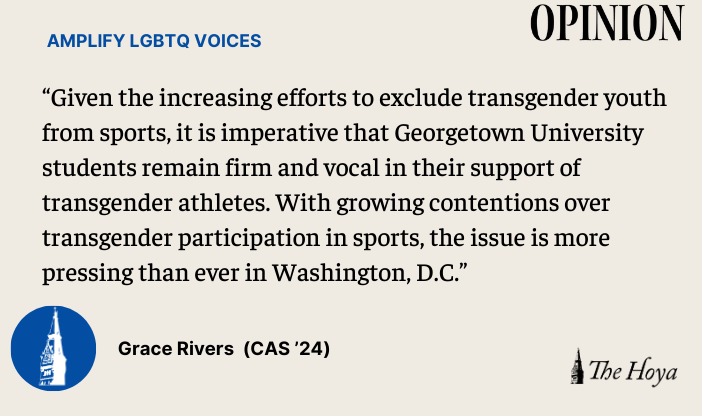The last three years have seen a rapid escalation in legislation banning or restricting transgender youth from participating in sports on the basis of their gender identity.
Since 2020, 23 states have passed laws which ban or restrict transgender students from participation in sports, resulting in 34% of transgender youth living in a state that hinders their athletic involvement.
In addition, the U.S. House of Representatives passed HR 734, a 2023 federal bill that would imitate those at the state level and potentially ban transgender women from participating in women’s athletic divisions on account of Title IX. Although the bill is unlikely to become law, it nonetheless speaks to fervent Republican efforts to ostracize transgender youth.
Given the increasing efforts to exclude transgender youth from sports, it is imperative that Georgetown University students remain firm and vocal in their support of transgender athletes. With growing contentions over transgender participation in sports, the issue is more pressing than ever in Washington, D.C.
Current controversy can be attributed to Idaho’s HB 500. Idaho Representative Barbara Ehardt (R-Id.) introduced the bill in 2020 as an attempt to regulate transgender girls’ eligibility in athletic competitions at public schools. The bill, signed into law in March 2020, established Idaho as the first state with such a restriction and ignited national debate over the role of transgender youth’s participation in sports.
With this proliferation of anti-trans legislation, a particular anxiety has surrounded transgender girls’ participation in female sports.
Opponents argue that cisgender women are at a disadvantage with the inclusion of transgender women on the basis of biology. Of the 23 states which bar transgender youth’s participation in sports, 18 of them place specific bans on transgender girls’ participation.
To this end, a number of states have passed a Fairness in Women’s Sports Act — including Idaho, Florida, Arkansas and North Carolina — which prohibits transgender female athletes from participating in women’s competition at the middle school, high school and collegiate levels. Such bills are motivated by a burgeoning fear that those assigned the male sex at birth will impede fairness in women’s sports and will unjustly “steal” recognition due to their physiological advantages.
The contentions over transgender youth are creeping closer to D.C.
For example, West Virginia passed HB 3293 in March 2021, which restricts transgender girls’ participation in interscholastic athletic competition. In Jan. 2023, a federal district court in West Virginia upheld the constitutionality of the Save Women’s Sports Act, which aims to prevent transgender women’s participation in women’s sports. The Supreme Court of the United States refused to intervene in this case, allowing the law to remain in effect.
In Virginia, Governor Glenn Youngkin’s (R-Va.) administration finalized new guidance concerning transgender athlete participation in sports in July 2023. This guidance suggests that athletic competitions must refer to minors by their names and pronouns assigned at birth, unless given parental approval. Although the Virginia High School League — which oversees school sports in the state — will not alter its more inclusive policies, the new regulations nonetheless underscore the particular vulnerability of trans youth rights in the state.
Advocates for transgender youth participation in sports constantly remind their opponents of the significant social, psychological and emotional benefits offered by athletic involvement.
According to the Center for American Progress, some of the benefits of competitive sports include lower rates of obesity, anxiety, depression and suicide attempts, increased self-esteem and academic performance, stronger feelings of school connectedness and school-based social support and feelings of comradery and sportsmanship.
Particularly for middle-school-aged trans kids, connection with peers is of the utmost importance. With this in mind, trans youth’s inclusion in sports proves all the more necessary.
As Georgetown students, we must remain steadfast in our support of trans youth participation in athletic divisions compatible with their gender identity.
Although the District has not enacted its own legislation restricting transgender youth participation in sports, controversy in Virginia and West Virginia indicates that trans youth are vulnerable in the region.
Georgetown students can tangibly advocate for fair and equitable athletic competition for those of all gender identities by attending speaker events on campus related to transgender participation in sports, joining GU Pride, supporting the LBGTQ Resource Center and participating in marches in the greater D.C. area.
Grace Rivers is a senior in the College of Arts & Sciences. This is the second installment of her column, Amplify LGBTQ Voices.














